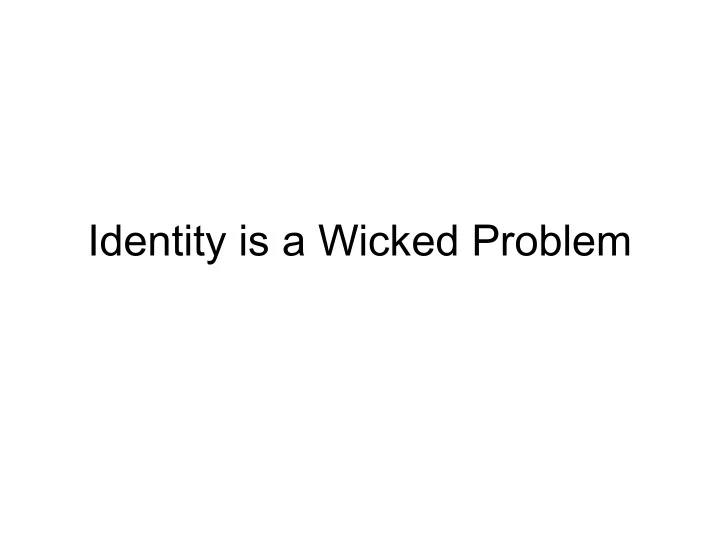

Identity is a Wicked Problem
Identity is a "Wicked" Problem There is no universally accepted definition of the problem . Is the problem that we have too many hard-to-remember passwords? That we have passwords at all? That passwords are too weak? That I cannot protect my identity and my anonymity? That I cannot easily describe the many facets of my life in a single online profile on Facebook?
Identity is a "Wicked" Problem There is no stopping rule . How will we know when the online identity problem is solved?
Identity is a "Wicked" Problem Solutions are not true or false, but bad-or-good. We might describe client-side-certificates as "better" than passwords (or worse), but we certainly wouldn't describe one as true in the mathematical sense (although we could describe specific technical properties as true).
Identity is a "Wicked" Problem There is no immediate test of a solution. Did Google implementing two-factory authentication for login "solve" their identity problems? Only time will tell. Perhaps we will see the problem shift to malware and compromised clients.
Identity is a "Wicked" Problem Every solution to a wicked problem is a "one-shot operation." An initial mistake about how the social graph was created from contacts in our email accounts effectively dealt Google Buzz a blow from which it has so far been unable to recover.
Identity is a "Wicked" Problem Wicked problems do not have an enumerable set of solutions. Clearly we've been trying to figure out how to do identity management on the net for 15+ years, and yet we still see new ideas every other week.
Identity is a "Wicked" Problem Every wicked problem is essentially unique . Identity on the web is not like identity in the real world; there is no physical confirmation of a person that we can use, and every interaction is mediated by a (usually possibly compromised) client. It is not like identity on a single computer. It is not even like identity on a corporate intranet. The hard-won lessons we’ve learned in other situations don’t apply as often as they do apply.
Identity is a "Wicked" Problem Every wicked problem can be considered to be a symptom of another problem. Perhaps password problems and phishing exist because we don't have a PKI infrastructure. Perhaps we don't have a PKI infrastructure because we don't know how to establish highly available trust zones amongst mutually distrusting parties. How do we stop moving the problem around?
Identity is a "Wicked" Problem Discrepancies can be explained away. Did client-side-certificates fail to solve the identity problem because concept of PKI doesn't work, or because the user interface to them in browsers was awful?
Identity is a "Wicked" Problem What do we do? Rittel's hypothesis (and Conklin's): ● Build shared understanding ● Build shared memory
Identity is a "Wicked" Problem The planner has no right to be wrong. The failure of Microsoft Passport caused almost everybody I know outside of Microsoft to (unfairly) write off CardSpace almost immediately.
Identity is a "Wicked" Problem References: ● Rittel, Horst, and Melvin Webber; "Dilemmas in a General Theory of Planning," pp. 155–169, Policy Sciences , Vol. 4, Elsevier Scientific Publishing Company, Inc., Amsterdam, 1973. http://www.uctc. net/mwebber/Rittel+Webber+Dilemmas+General_Theory_of_Planning.pdf ● Conklin, Jeff. Dialogue Mapping: Building Shared Understanding of Wicked Problems. Wiley, 2005. ● http://cognexus.org/wpf/wickedproblems.pdf ● http://cognexus.org/
Recommend
More recommend